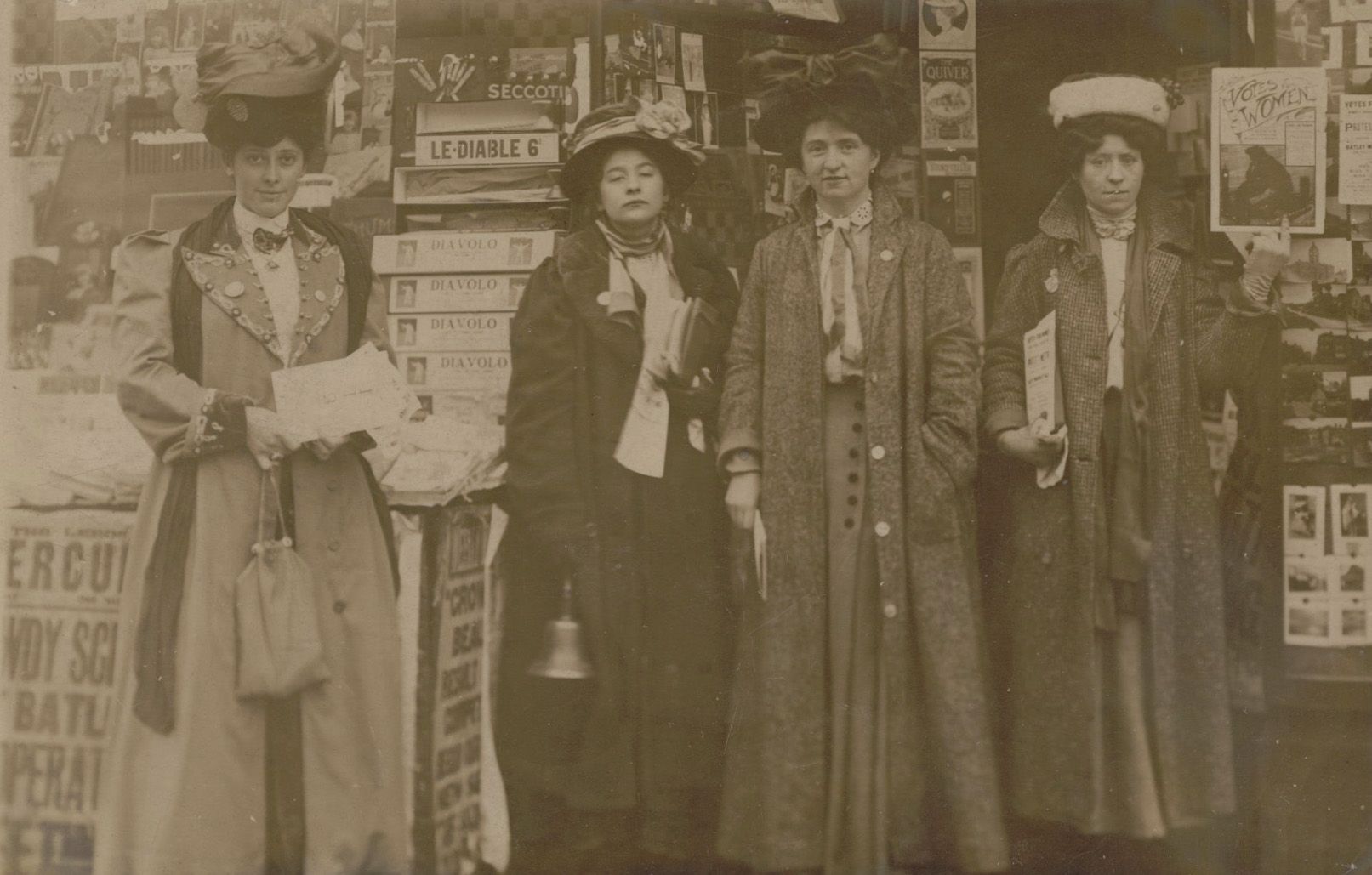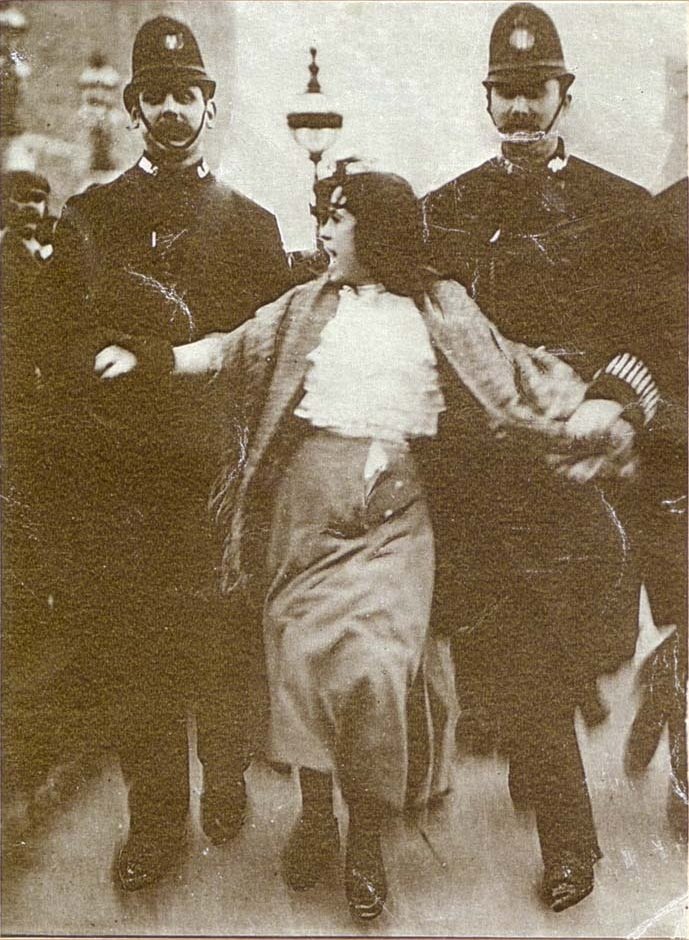The Women’s Social and Political Union (WSPU) was founded in Manchester in 1903 by Emmeline Pankhurst and her daughters. It was a women-only group focused on gender solidarity and gaining the vote.
Frustrated by slow progress, the WSPU adopted militant tactics under the slogan “Deeds Not Words.” Their actions included disrupting political meetings, smashing windows, and damaging property to draw attention to their cause.
Adela Pankhurst, the youngest daughter, became a powerful speaker, inspiring large crowds and helping to grow support. WSPU branches were set up in Dewsbury, Batley, and most actively in Huddersfield.
Held in June 1908, Women’s Sunday was the largest demonstration London had seen, with 40,000 people attending. Organised by the WSPU, it brought women from branches across the country to Hyde Park, where 80 speakers spoke on 20 platforms, including Huddersfield’s Gertrude Brook.
The WSPU wanted to show how strong support for women’s voting rights was and prove women could organize a huge event on their own. The Huddersfield branch was asked to send 200 delegates, but many working-class women found it hard to afford the 11 shillings for train fare or the required white clothing with purple and green accessories.
Only 24 tickets were initially sold, so Emmeline Pankhurst and Nell Kenney came to help. After going door to door and offering financial aid, 60 women from Huddersfield managed to attend.
Huddersfield
In January 1907, the Huddersfield branch of the Women’s Social and Political Union (WSPU) held its first meeting at Robinson’s Café, attended by Emmeline Pankhurst. The branch quickly grew, with 50 women joining, led by Secretary Edith Key.
Starting in February 1907, Huddersfield members joined large suffrage protests in London, called the ‘Women’s Parliament’, where they presented petitions to Members of Parliament. Many women, and some men, from the area were arrested during these demonstrations.
“The Huddersfield W.S.P.U. organised a magnificent meeting in Sheffield Town Hall, which was addressed by Mrs. Pethick Lawrence and Miss Christabel Pankhurst. Mrs. Willson, of Halifax, presided. The hall was very full, and some little disturbance, caused by a few youths, who were removed by the police, occurred at the back. Mrs. Pethick Lawrence, speaking first dealt with the reasons why women claim the right to vote, and the need of improvement in their social and industrial condition. She made a stirring appeal to the women to give their money to the cause. Miss Christabel Pankhurst dealt with the tactics of the W.S.P.U. she pointed out that Mr. Asquith, in condemning our methods, laid great stress on our preventing the right of free speech in Liberal meetings; but she pointed out that the right to the vote was so much greater that the right to free speech, and so long as Mr. Asquith prevented our getting the right to vote, we were perfectly justified in preventing his right to free speech….” From Votes for Women (12th December 1907) by Adela Pankhurst.
On 3rd May, a bomb was found at a reservoir in Penistone, supplying water to towns in North Kirklees. Newspapers reported that ‘feminist literature’ was found nearby, so suffragettes were quickly blamed.
Almost two months later, the Huddersfield Daily Examiner reported that the case was nearly closed. Although the Women’s Social and Political Union no longer considered this a militant act, the identity and motive of those who planted the bomb remain unknown.
Ann Alice Older
Ann Older was born in Slaithwaite in 1876. She married Charles Older and lived in Honley, where their daughter Muriel was born in 1915.
On 12th February 1908, Ann was arrested in Westminster during a protest as a member of the Women’s Social and Political Union (WSPU). She travelled to London with Gertrude ‘Ellen’ Brook. Both were charged with insulting behaviour and obstructing police, and each served six weeks in Holloway Prison.
Bertha Lowenthal
Bertha Susan Lowenthal was born in Huddersfield in 1857 to a prominent German family. Her father, Joseph, was a wool merchant and active community leader. Bertha grew up in a well-off household in Edgerton, Huddersfield.
When the Huddersfield Suffrage Society re-formed in 1904, Bertha became its Secretary. By 1907, she was a Vice President of the Huddersfield branch and also an early member of the Huddersfield WSPU branch. She became Honorary Secretary by 1911, playing a key leadership role in the WSPU’s local activities, including speaking at public meetings such as one in Scarborough in 1910.
Interestingly, her younger brother Charles was the lead prosecutor against the suffragette Lilian Lenton in a notable arson case.
Dora Thewlis
Dora Thewlis, along with her mother Eliza, was a member of the Huddersfield branch of the Women’s Social and Political Union (WSPU). At just 16, she was likely the youngest member of the group.
On 20th March 1907, Dora travelled to London with other Huddersfield members to join a large protest at the House of Commons. After trying for hours to enter, 75 women, including Dora, were arrested. A photo of her arrest appeared on the front page of the Daily Mirror the next day. She was held on remand for seven days at Holloway Prison.
At home in Huddersfield, Dora worked as a mill weaver, doing 10-hour days for less than £1 a week (£104 in today’s value). When she was taken to court after the London protest, the judge was surprised she was not in school and had been allowed to travel so far. However, many working-class girls like Dora worked full-time from around age 13.
Dora told the court she came to London with her parents’ full consent, to represent her family in the suffrage movement, and that she was old enough to take care of herself. Her parents were upset by the judge’s criticism and wrote to him in response. Her mother, Eliza, was an active suffragette and proud of Dora.
After a week in prison, Dora was released and returned to Huddersfield. In an interview, she spoke about poor treatment in prison and how being called a “baby” by others hurt her deeply.
Elizabeth Pinnance
Born around 1879 in Paddock, Elizabeth left school at 10 and worked part-time as a rug weaver. She married Robert Pinnance, a trade unionist and cloth presser, and they had three children. The family were active in the Independent Labour Party. Due to Robert’s union work, he was blacklisted by local mills and worked in Lancashire while the family stayed in Huddersfield.
In 1907, Elizabeth joined a protest in Westminster with other Huddersfield suffragettes, including Dora Thewlis. She was arrested and sentenced to six weeks in Holloway Prison.
Elizabeth remained active locally after her imprisonment. In February 1908, she spoke at the Hunslet Moor rally during the South Leeds by-election, addressing a crowd of 60,000. The event featured torchlight processions, a brass band, banners, and suffragette songs such as the one below.
Vote, vote for women, they'll vote for you ;
They will to children and to all be true.
This is the message we bring to you-
Vote, vote for women, and they'll vote for you.

